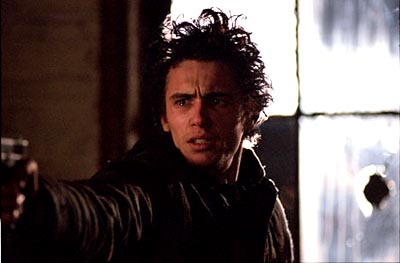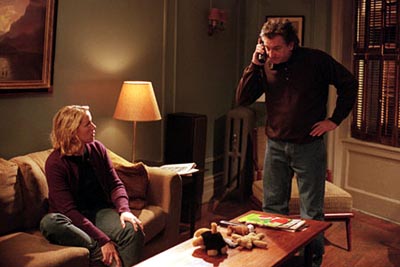

In City by the Sea, Long Beach was once a great place to live. Vincent LeMarca remembers the beautiful boardwalk where he would play with his son, as well as the safety and familial environment. That was years ago. Now, Long Beach is in ruins. Drug abusers and empty, decaying buildings abound. LeMarca's life is also in shambles (ooh, a metaphor!). He had an acrimonious divorce from his first wife and never got to see his son grow up. Now, LeMarca (Robert De Niro, Showtime, The Score), a policeman, lives by himself, has a convenient relationship with the woman downstairs (Frances McDormand, The Man Who Wasn't There, Scottsboro: An American Tragedy), and lives a relatively sedate life. Everything changes when he begins investigate the stabbing of a local drug pusher. The clues lead to a person named "Joey Nova," but as LeMarca furthers the investigation he realizes that Joey Nova is his estranged son, Joey LeMarca (James Franco, Spider-Man, Deuce's Wild).
Not only is Joey the primary suspect in a murder investigation, but he is also a junkie. And, Vincent's father was electrocuted in a high profile case years ago. Now, LeMarca's superiors remove LeMarca from the case because of the high profile. As crazy as this sounds, it is based on a true story, chronicled in the article "Mark of a Murderer" by Michael McAlary and adapted by Ken Hixon (Inventing the Abbots, Terror at Deception Ridge). In fact, it seems that all movies with extremely outlandish plots like this come from "real" events (with some licenses taken of course). Although the story may be something new, the entire concept feels old, and it causes the entire film to have a stale feeling. There is nothing wrong with the film, and the acting is above average, but there is nothing to make this film feel like anything out of the ordinary. The story seems like something straight from a television movie.
City by the Sea is primarily a movie about father/son relationships, with a murder investigation thrown in. Joey's drug addiction caused his Gina (Eliza Dushku, The New Guy, Soul Survivors) to kick him out, taking away the contact with his newborn son. LeMarca has no relationship with Joey, and is haunted by conflicting memories of his father. Joey is at a crossroads in his life, and LeMarca doesn't want his son to turn out like him. Yet director Michael Caton-Jones (The Jackal, Rob Roy) continually goes back to the investigation, the portion of the story that is the least interesting. The ending is fairly obvious, since there is only one way to make this story worthy of an article and movie adaptation, but is also one of those endings where things wrap up a little too nicely, cheapening the overall effect of the movie.
This also means that there is less a focus on the acting, and more on the action. McDormand loses out the most. She is very good Michelle, an older woman who is trying to have a relationship with LeMarca, but she does not have enough screen time to cement her role. It is much more enjoyable watching Franco and De Niro, although the latter toes the line near the end between acting and over-acting. They two do not spend that much time on screen together because of the story structure, and that also is unfortunate. And, because Franco is on the run so much, the lion's share of screen time goes to De Niro. He is a great actor, but this is not one of his stronger roles (it is much better than most of his comedies though). The LeMarca character internalizes everything, shutting himself down whenever somebody confronts him with emotional matters. This means that De Niro needs to act in an appropriate manner, keeping things inside until they reach a boiling point. Like most everything else in City by the Sea, that boiling point does come but feels artificial.